Most of us are aware of the tried-and-true supermarket food shopping tips — shop the periphery of the store (as that’s where the least processed foods and fresh produce usually are); don’t buy foods just because you have coupons for them; don’t shop when you’re hungry or without a list; and the like. Shopping at natural foods stores can be a nice break from the big box experience, and introduce you to foods your supermarket may not carry. They're great sources to provide foods for the plant-based diet.
Just to be clear, we're talking about stores that stock mainly food, and not "health food stores" that are basically vitamin and supplement shops! If you’re new to the natural foods store experience, here are some tips.
Prices can vary significantly from one natural foods store to another. The one in the town in which I live has prices that are about 20% lower than the natural foods store about 10 miles away. And don’t assume that the larger store will have better prices; in the case of the aforementioned stores, it’s just the opposite.
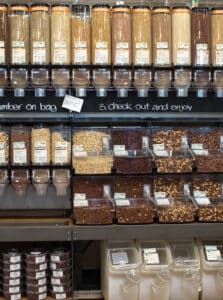 Look for weekly or monthly discounts. Natural foods stores often distribute circulars detailing discounts on various foods. These are often tied into specials offered by their distributors. Pay attention to these, as the savings can be significant. Of course, the key is to use these savings on items you’ll actually use.
Look for weekly or monthly discounts. Natural foods stores often distribute circulars detailing discounts on various foods. These are often tied into specials offered by their distributors. Pay attention to these, as the savings can be significant. Of course, the key is to use these savings on items you’ll actually use.
Bulk bin buying is truly cost-effective. But just because it’s bulk, it doesn’t mean you need to go crazy and buy ten pounds of quinoa or brown rice at once. As a rule of thumb, buy what you’ll use within a month or two. Nuts and seeds, rich in fats, can go rancid if kept too long.Even dry items like grains or lentils can go rancid.
Shop at active stores. Another note on buying bulk items, make sure to buy these in an active store, where regular turnover ensures that what you’re buying is fresh.
Consider herbs and spices in bulk. If you go through a lot of certain seasonings, this can be not only a source of savings, but bulk seasonings can be especially fresh and fragrant if there’s good turnover in that area of the store.
Watch out for the sweets. “Naturally sweetened” candies, fruit juices too high in sugars, and snacks that provide empty calories, even if they have no additives, do nothing for your health or budget.
Know the difference between convenient and convenience. Don’t fall into the convenience food trap, just because such items are stocked in natural foods stores. Prepared soups, macaroni and cheese, pizza, etc. may have more natural ingredients than the supermarket equivalents, but they can still be expensive and high in sodium. But salad dressings, sauces, broths, and the like, can enhance whole food meals.
Buy organic produce, but make sure it's fresh. Some natural foods stores offer the most glorious organic produce, but others, where there's little turnover, display the saddest, wilted produce. Your eyes can see the difference. Produce that's been on the road or in the bins too long will have lost its flavor and nutritional value.
Look for online coupons. Speaking of convenient products, many natural foods companies offer coupons online. If there are brands of good-quality packaged items you like, such as vegetable stock, packaged salads, tofu, vegan cheeses, canned beans, and such, check each particular company’s web site.
Special order if you can’t find what you’re looking for. If you live in an area that has a smaller natural foods store that can’t stock as much as the national natural stores do, most will special order items that you don’t see on the shelves.
Photos by Hannah Kaminsky © 2013.


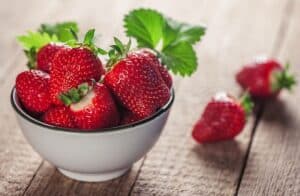
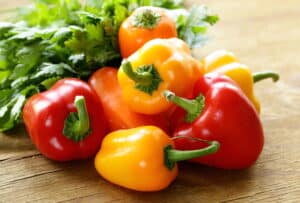
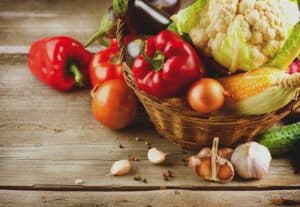
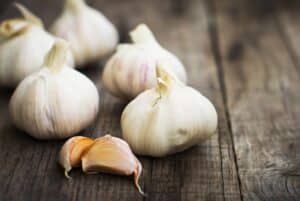
Ivy Baker says
I loved your advice about when buying things from the bulk bins you should buy for one or two months. Doing that does seem like it would help me save money and not end up wasting food. Also, I really love all the creative and fun things that you can find in those bulk bins lately. Getting those things could help me be more excited about cooking.